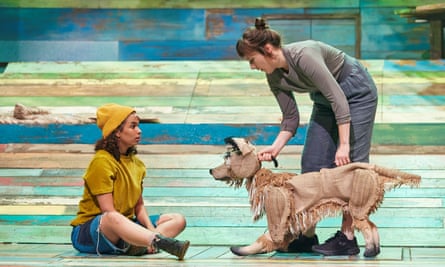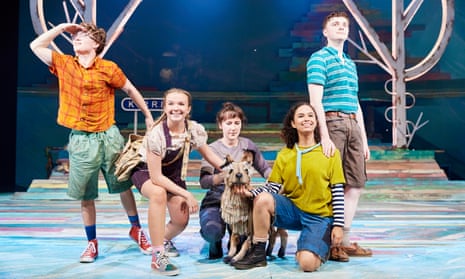To paraphrase that other musical starring household pets: the naming of gangs is a difficult matter / It isn’t just one of your holiday games. How Julian, Dick, Anne, George and Timmy come to label their intrepid collective is a question threaded throughout Elinor Cook and Theo Jamieson’s musical adaptation of The Famous Five.
Cook’s script imbues Enid Blyton’s eponymous adventurers with a contemporary sensibility, emulating a recognisable Blytonesque vibe but with an original narrative. Less concerned with shipwrecks and spies, the fate of humanity now lies in their hands. Here, Uncle Quentin is neglecting his fatherly duties to develop a synthetic algae that can be used as a source of renewable energy. But a vengeful ex-colleague appears on the beaches of Kirrin Island, threatening to derail his hope of repairing a damaged planet.
Briskly directed by Tamara Harvey and with enough charm to fill an entire summer’s worth of picnic baskets, it is pluckily performed, with Isabelle Methven as Anne, Kibong Tanji as Rowena and Lara Denning as Aunt Fanny being particularly winning. The greatest cheer on opening night was reserved for the delightfully emotive puppet Timmy, designed by Rachael Canning and performed by Ailsa Dalling.

Jamieson’s songs are often musically complex and lyrically playful: the audacious rhyming of hummus and satsumas deserves special mention. But the difficult matter is reconciling the rhythms of this narrative world with the dramatic beats of a musical. The narrative thrust of Blyton’s novels is predicated by their alacrity; their pacing allows little space for much else. This is hard to sustain within a musical, especially when many songs are solo numbers. Swift plotting is replaced by introspection, holding up the fun stuff. It is no wonder that the most dramatically compelling numbers are sung by the adult women.
Perhaps the challenge is adapting a series of books where their tenor is recognisable but narrative turns are interchangeable. The Famous Five are already famous. We know their names, who they are and what they become, even in their forever childhoods. As the final number suggests, even after saving the planet, this feels like jolly exposition for more interesting adventures yet to come.

Comments (…)
Sign in or create your Guardian account to join the discussion